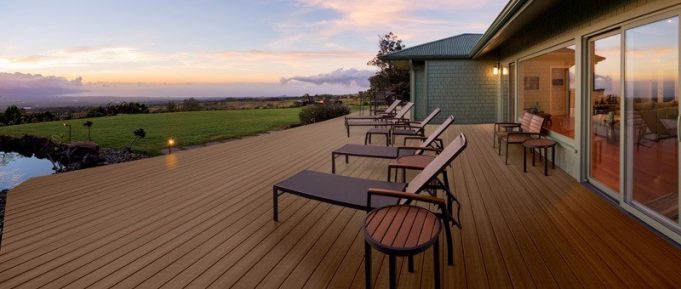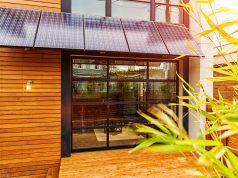In the current climate there is a huge movement towards improving the eco-friendliness of all aspects of our lives. We are encouraged to be proactive about the materials and chemicals we use daily and the impact they have on the environment. It, therefore, comes as no surprise that people are conscious of the materials that they’re using in their gardens too.
Composite decking, comprised of a mixture of wood and polymer materials, is considered one of the eco-friendlier decking options on the market. To demonstrate why we will make comparisons between the three most popular decking materials, composite, wood, and plastic – to highlight their eco-friendly attributes and potential harmful characteristics.
When choosing a new deck for your vertical garden, if you want to make the eco-friendliest decision there are a few things to take into consideration, such as, the composition of the decking, the manufacturing processes it goes through and the techniques used to maintain it.
Plastic decking
Arguably the least environmentally friendly choice on the market, plastic decking is composed entirely of man-made materials such as polyvinyl chloride. Due to the composition of plastic decking, the manufacturing processes used to create it produces carcinogenic fumes that are emitted into the air, contributing to pollution levels.
One benefit of plastic decking, is that once it’s installed it doesn’t require staining or sealing so no further chemicals are added to the decking. However, disposing of plastic decking can be difficult because it doesn’t biodegrade like wooden decking. Unsurprisingly, garden enthusiasts who are conscious of their environmental impact tend to stay away from plastic decking.
Wood decking
On the surface, wood decking appears to be the most environmentally friendly option. However, when you consider the many thousands of trees that are cut down to produce natural wood decking each year, your perspective might change.
Besides tree felling, the transportation of wood to create natural decking also contributes to pollution levels, with tonnes of tropical hardwoods being shipped worldwide each day. Furthermore, the stains and sealants required to maintain natural wood decking release, often toxic, chemicals into the atmosphere when they are applied – so the annual upkeep of wood decking continues to impact the environment throughout the course of its life.
The major positive of choosing wood decking, is that it can be disposed of in a relatively responsible way once it is no longer needed. The wood decking itself can be burnt or re-purposed, but the stains and sealants applied to the wood should be considered when doing so.
Composite decking
So, how does composite decking compare to these decking options? Composite decking suppliers like TimberTech are working towards a more sustainable world by using recycled material to create composite decking. TimberTech do not cut down any trees at all to produce their composite decking, in fact the wood and plastics used to create their deck boards are post-industrial and post-consumer resources, so their deck boards are made entirely out of recycled materials. Thanks to composite decking suppliers who manufacture their boards in this way, tonnes of wood and plastic is saved from landfills each year.
There are other environmental benefits of installing composite decking, for example, once installed, composite decking does not require annual staining or sealing. Thus, no harsh or toxic chemicals are added, so its environmental impact after installation is very minimal.
While some composite decks cannot be recycled after use, choosing composite decking can still be a wise choice because of its long life. Wood and plastic decking aren’t likely to last as long as composite decking, which typically has a life span of 25-30 years. You might need to replace and dispose of wood and plastic decking regularly, which isn’t the case if you choose high-quality composite decking instead.
There are positives and negatives to every decking option, but as far as environmental impact goes, it can be argued that composite decking is a reasonably green choice when compared to other decking materials on the market.














